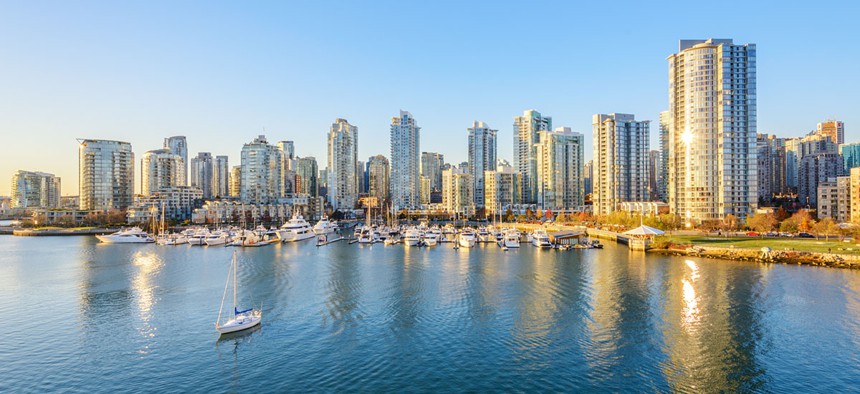Could Immigration Policy Turn Vancouver Into Silicon Valley?

ppa/Shutterstock.com
The Canadian city already hosts a range of companies, from Amazon to Hootsuite. After President Trump’s executive order, it could really capitalize on a tech sector built by foreign workers.
This article originally appeared in Spanish on our sister site, CityLab Latino.
In the last week, Richard Kurland’s phone has hardly stopped ringing. He is an immigration lawyer based in Vancouver. The calls come in from across the United States, mainly from foreign-born executives and people with master’s and doctoral degrees. “Pretty much every immigration lawyer in Canada has been receiving many requests for assistance from people in within the United States,” Kurland explains on the phone. “Much has changed within the last few days.”
These requests are fueled by fear amplified by the American political climate, the lawyer says. “They were all concerned with the Trump presidential win and the last straw was the presidential order,” Kurland adds. On top of the Muslim travel ban (or whatever you want to call it), this week the administration announced the possibility of extreme limits to the H-1B visa program, which brings high skilled workers to the United States. That has Silicon Valley worried. But one tech hub’s loss is another one’s gain.
“In Canada we have a more open immigration policy, and in Vancouver we have a growing tech sector,” Michael Tippett, a Vancouver-based entrepreneur, explains.
“Also we have the same time zone as Silicon Valley, which makes a big difference when working with different teams across borders.”
Tippett, with a small group of entrepreneurs in Vancouver and the Bay Area, created a company—True North—that is trying to make things easier for the ones that want to jump across the border. “My concern was that people in Silicon Valley who are foreign-born will have to leave the country, and those innovative teams would be broken up,” Tippett says. “We wanted to help them congregate in one place.”
For $6,000 USD, True North offers a travel package, immigration law consultation, and help creating a subsidiary in Canada (although a lot of tech companies, such as Amazon and Hootsuite, already have offices in Vancouver), among other logistical assistance. Just like Richard Kurland’s phone, Tippett’s e-mail has been extremely busy.
“It is very normal for U.S. companies to use the Canadian subsidiary as a safety zone,” Kurland explains. “If they can’t qualify for the H-1B status, many times [the companies] send them to Canada for one or two years. What is different now is the intensity.”
And Vancouver is a great option. Consistently chosen as one of the cities with best quality of life in the world, the logistic advantages pair well with good schools, solid public transportation, free healthcare, and beautiful surroundings. Of course, nothing is perfect. “I think the big challenge for Vancouver is that is an expensive city,” Tippett says. “We need to manage this process; we don’t want to drive rents up more than we already have.” Still, he adds, “the opportunity is much greater than the cost.”
This is also an opportunity for local governments to step up. Tippett’s company is already working with the Vancouver mayor’s office. They think the city can help locate people and companies, as well as connect different organizations and create partnerships. “The city can also be an advocate and lobby the federal government to facilitate the immigration process,” Tippett explains.
Right now, British Columbia’s technology sector employs 92,000 people, but people in Vancouver are optimistic that the share of immigrant talent in the industry will help it grow even more—the opposite of what could happen in United States, as Richard Florida explained in a recent CityLab article. “The share of more educated immigrants [in the United States] has fallen relative to other nations,” Florida wrote. “Trump’s immigration crackdown comes at the worst possible time for America’s ability to attract global talent.”
In Vancouver, spirits are higher. “I think we are about to experience what Europe saw around the Second World War, [when] people with education and skills were nervous [and] left for America,” Kurland says. “I see a similar pattern. Many countries will benefit.”





